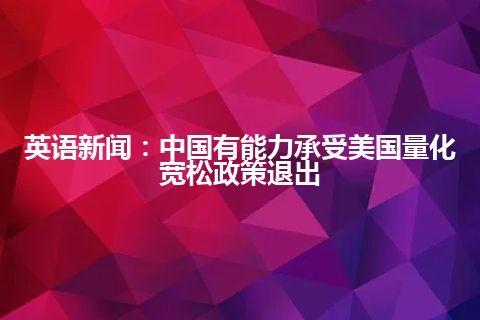Although the United States' tapering of quantitative easing this year will pose a "significant challenge", China is capable of withstanding the change, according to a Chinese financial official.

Guan Tao, the State Administration of Foreign Exchange official in charge of balance of payments, said the ending of quantitative easing would even be seen as a good thing.
With the effects of the tapering, or gradual reduction, still to be fully felt in China, its foreign exchange authorities anticipate that the consequences for capital outflows are unlikely to shake the fundamentals of the Chinese market, Guan said.
The Chinese view stems from the experience last year, when the US Federal Reserve Board's announcement of its quantitative easing exit strategy triggered capital outflows from many emerging-market countries. It also saw exchange rates with the US dollar tumble, Guan said.
He said that in contrast, the yuan's exchange rate to the dollar rose by 3.1 percent last year, as the country's foreign currency reserves continued to swell from $3.31 trillion at the end of 2012 to $3.82 trillion a year later.
Quantitative easing is a monetary policy used by central banks to stimulate the economy when standard monetary policy has become ineffective. A central bank implements it by buying specified amounts of financial assets from commercial banks and other private institutions, thus increasing the monetary base and lowering the yield on the financial assets.
Guan said China's confidence for this year stems from the resolve shown by the national leadership to forge ahead with reform and opening-up, which will guarantee that the economy grows steadily.
He also said the US exit from quantitative easing is not a bad thing, as it indicates that the US economy is recovering. It means US import demand will rise in the long run and this will alleviate pressure for the yuan to appreciate further.
Guan said the foreign exchange administration also anticipates that China will have a trade and investment surplus in 2014. If its economy can grow faster than others, it will still attract more international investors to increase their renminbi assets, he said.
"Considering the relatively high yuan interest rate, if it can remain stable in the foreign exchange rates, or maybe rise slightly, it will still generate an inbound flow of capital," adding to China's already large foreign exchange reserves.
The foreign exchange administration said China had a surplus of 1.68 trillion yuan ($270.2 billion) in foreign exchange settlements in 2013, up 210 percent from the previous year.
Shen Minggao, Citibank's chief economist in Greater China, said the risk of capital inflows is greater than capital outflows in the short term.
But he also stressed that the trend of cross-border capital flows will be affected by several factors in the second half of this year, including the performance of Chinese exports and the speed with which the US Federal Reserve exits from the quantitative easing policy.
Under current pressure from capital inflows, Shen suggested the foreign exchange administration relax its control of capital outflow modestly — for example, by increasing the annual maximum amount of foreign exchange purchases for Chinese residents from $50,000 to $100,000 or more.
The government should also allow the exchange rate for the renminbi to fluctuate, which would restrain the short-term inflow of hot money, he said.
Guan echoed Shen's view on fluctuation.
"In the future, it will be commonplace for the renminbi exchange rate to go up or down. All companies and banks should make adjustments based on that development trend and be prepared for potential losses caused by yuan depreciation," Guan said.
Wen Bin, supervisor of macroeconomic research at the Bank of China's Institute of International Finance, said the renminbi exchange rate is likely to decline and such an expectation may lead to rapid cross-border capital flows.
To prevent hot money flowing rapidly into and out of China, the government should increase the costs for cross-border capital flows and prepare more flexible measures for foreign exchange management, Wen said.